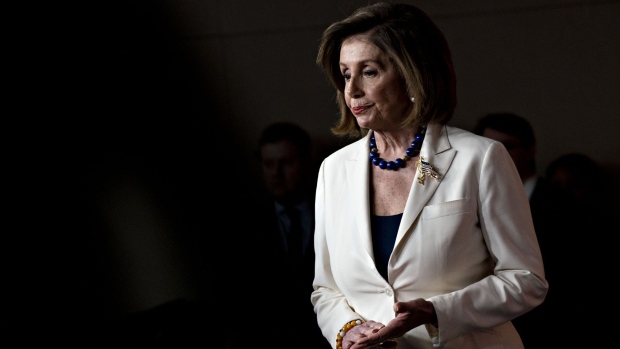Mar 13, 2020
Pelosi says virus-bill deal reached with Trump administration
, Bloomberg News

House Speaker Nancy Pelosi said she reached a deal with the Trump administration Friday on legislation to help Americans deal with the spreading coronavirus outbreak and said the chamber will vote on the measure soon.
President Donald Trump is ready to sign off on the deal, which was presented to him by Treasury Secretary Steven Mnuchin, according to two people familiar with the matter.
“We are proud to have reached an agreement with the administration to resolve outstanding challenges, and now will soon pass the Families First Coronavirus Response Act,” Pelosi said in a message to lawmakers Friday.
The House plans to vote on the plan Friday night, and the Senate is likely to address it after returning to session on Monday.
Pelosi said the plan includes free testing for everyone who needs it, two weeks of paid sick leave, enhanced jobless benefits, increased food aid for children, senior citizens and food banks, and higher funding for Medicaid benefits. Democrats trimmed back several provisions that raised objections from Trump and congressional Republicans.
Hours earlier, as he announced a national emergency, the president told reporters at the White House that Democrats weren’t giving enough in the negotiations.
“We thought we had something but all of a sudden they didn’t agree to certain things they agreed to,” he said. Pelosi and Mnuchin, however, were still in touch and hammering out the final details by telephone.
The final version of the agreement was still being put into legislative language. Trump hadn’t yet publicly said he agreed.
Representative Kay Granger of Texas, the top Republican on the House Appropriations Committee, said GOP lawmakers are still looking at the agreement and she can’t say whether she would support it yet.
“Until it’s finished you can’t tell,” Granger said, adding that she still expects the House to vote Friday night.
Pelosi said while the Senate works on the House bill, her chamber will begin working on a third emergency response measure.
Last week Congress passed and Trump signed into law an emergency spending bill that made available about US$8 billion to reimburse state and local governments for the cost of preparing for and fighting the virus, stockpile medical supplies and purchase tests, vaccines and therapies to ensure that the poor have access. It also permits Medicare to spend US$500 million on telehealth programs for the virus.
With infections multiplying and no vaccine immediately available, Pelosi pushed ahead with a Democrats-only plan earlier this week when the Trump administration didn’t deliver a promised proposal to respond to the economic consequences of the outbreak.
After Trump’s error-filled Oval Office address Wednesday failed to calm roiling equity markets, the president followed up with a news conference Friday afternoon at which he declared a national emergency and announced a set of measures to address a shortage in testing kits and cushion the economic fallout.
Markets rallied at the end of the trading day as Trump spoke, unwinding almost 90 per cent of the previous day’s historic rout








